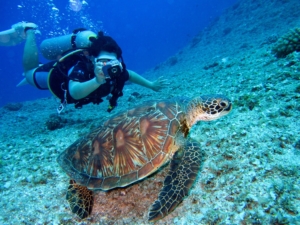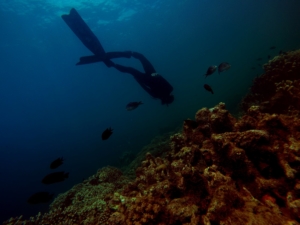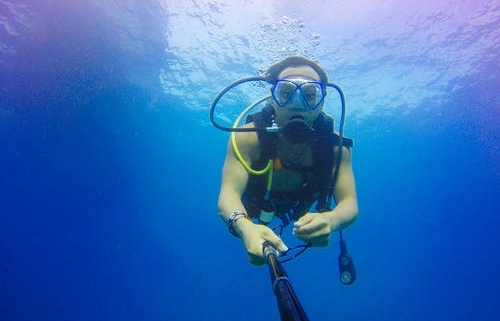Solo Diving: Is It Safe to Dive Without a Buddy?
After learning the basics of diving, you might be wondering whether it’s safe to dive alone. Known as solo diving, it’s a hot topic among professional and recreational divers alike. Some believe it’s a safe and acceptable practice, whereas others believe it’s too dangerous and, thus, should be avoided. So, before you go diving without a buddy, you should read the following about solo diving its associated risks.
The History of Solo Diving
 People have been diving alone for thousands of years. In Ancient Mesopotamia, archeological evidence shows that fishermen would dive alone to spearfish and collect oysters. The Greek poet Homer even referenced the act of solo diving in several of his poems, which are believed to have been published in the 6th to 8th century B.C. It wasn’t until the mid-1900s, however, when the buddy system was introduced to promote safer diving.
People have been diving alone for thousands of years. In Ancient Mesopotamia, archeological evidence shows that fishermen would dive alone to spearfish and collect oysters. The Greek poet Homer even referenced the act of solo diving in several of his poems, which are believed to have been published in the 6th to 8th century B.C. It wasn’t until the mid-1900s, however, when the buddy system was introduced to promote safer diving.
During the 1950s and 60s, divers were encouraged to dive with at least one other competent diver or “buddy” to reduce the risk of injury. In the years to follow, the buddy system became a fundamental philosophy of recreational diving. With divers submerging and exploring their underwater environments in groups of two or more, it lowers the risk of injury. If a diver experiences an emergency, another diver will be nearby to provide assistance. Divers can also alert their others to potential hazards using hand gestures or an underwater writing slate.
While the buddy system is still used in diving, solo diving has become more acceptable in recent years. In 1999, Scuba Diving International (SDI) launched the first officially recognized solo diving certification course. More recently, in 2011, the Professional Association of Diving Instructors (PADI) launched its own solo diving certification course. Therefore, it’s safe to say that the industry’s perception of solo diving has evolved over the years. When planned and executed properly, solo diving is no longer considered a dangerous activity, and you even become certified for solo diving by enrolling a reputable course.
Why Should I Go Diving Alone?
Using the buddy system requires you to dive simultaneously with at least one other competent diver. But what if your buddy isn’t available on the date when you want to dive? If your buddy isn’t free, you won’t be able to dive — not without diving alone, at least. Solo diving allows you to dive on your own schedule. Whether it’s the middle of the week or a weekend, you can dive whenever you please.
Some divers feel more stressed when diving in groups of two or more as opposed to diving alone. When you dive with a buddy, you’ll be required to watch over him or her and vise versa. If your buddy lacks your level of training and experience, you may somewhat burdened knowing that he or she is your responsibility. Solo diving eliminates this burden. The only person you’ll have to look out for when diving alone is yourself.
You’ll have more freedom to do what you want to do when diving alone than with a buddy. Maybe you want to take pictures of a brilliantly colored coral reef, or perhaps you want to check out an underwater structure like a sunken ship. Regardless, solo diving gives you the freedom to choose your own underwater activities. If you go diving with a buddy, on the other hand, you’ll have to spend at least some of your time underwater following him or her. When your buddy wants to venture to a different area, you must follow him or her while placing your own activities on the back burner.
Disadvantages of Solo Diving
 Although there are plenty of reasons to consider solo diving, there are still some disadvantages worth mentioning. Without a buddy, the risk for injury or even death is greater if you experience a health event when solo diving. According to PADI, nearly half of all diving-related fatalities involve a health event. While a health event can strike regardless of whether you dive alone or with a buddy, the chance for a positive outcome is higher if there’s another diver nearby.
Although there are plenty of reasons to consider solo diving, there are still some disadvantages worth mentioning. Without a buddy, the risk for injury or even death is greater if you experience a health event when solo diving. According to PADI, nearly half of all diving-related fatalities involve a health event. While a health event can strike regardless of whether you dive alone or with a buddy, the chance for a positive outcome is higher if there’s another diver nearby.
You won’t have the luxury of using your buddy’s equipment if your own equipment fails when diving alone. Diving with a buddy ensures redundancy in the event of equipment failure. If your air tank suddenly stops working, for instance, you can gesture to your buddy to use his or hers until you are able to safely resurface. When diving alone, you’ll only have access to the equipment you bring or wear. If it stops working — and you don’t have a backup on hand — you may find yourself in serious danger.
Solo diving prevents you from sharing your experience with other people. Diving with a buddy means that you and your buddy will have the same experience. Upon resurfacing, you can converse with your buddy while discussing the sights and sounds the two of you encountered. Solo diving, unfortunately, means you won’t be able to share your diving experience with anyone else.
There’s no one available to sign or stamp your dive log when solo diving. You can record your solo dives in a dive log, but you won’t be able to have those logs verified by a third party. If you’re trying to reach a specific number of dives for a diving certification, those unverified dive logs may not count towards your goal. As a result, they won’t help you earn your desired diving certification.
How to Prepare Yourself for Solo Diving
Solo diving can be safe, but you need to prepare yourself before venturing away from the buddy system. First and foremost, solo diving isn’t something that a beginner should attempt. Only experienced, well-trained divers should attempt to dive alone.
Even if you consider yourself more-experienced and better-trained than the average diver, you should still obtain certification before attempting to dive alone. Specifically, it’s recommended that you take either the PADI Self-Reliant Diver course or the SDI Solo Diver course. By enrolling and completing either of these courses, you’ll learn how to safely dive alone.
Requirements for enrolling in the SDI Solo Diver course include the following:
- 21 years of age or older
- SDI Advanced Diver certification or higher
- 100 or more logged dogs
Requirements for enrolling in the PADI Self-Reliant Diver course include the following:
- 18 years of age or older
- PADI Advanced Open Water Diver certification or higher
- 100 or more logged dives
- Completion of a skill assessment
When solo diving, stick to recreational depths. While diving in deep water may sound harmless, it’s not something that should be done alone. At depths of around 130 feet or greater, you’ll have to make regular stops for decompression to avoid the bends. By sticking to shallower water, the risk for an injury-causing accident is significantly reduced.
The key thing to remember is that you should obtain either PADI Self-Reliant Diver certification or SDI Solo Diver certification before diving alone. While both of these courses have strict requirements for enrollment, they’ll teach you the skills needed to safely dive without a buddy. After completing the course, you can test your solo diving skills in shallow water with a recreational depth.
Want to create your own custom dive logs? Contact us today to learn more about our custom dive logs.



